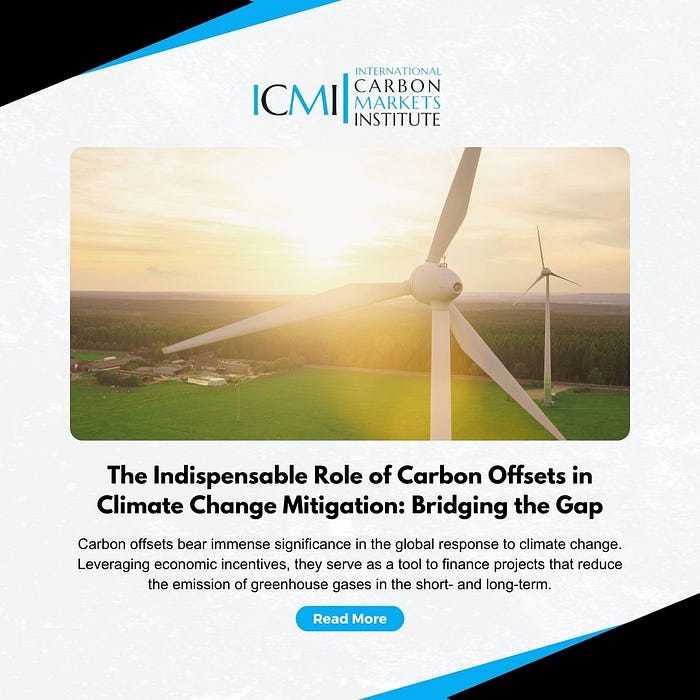The Indispensable Role of Carbon Offsets in Climate Change Mitigation: Bridging the Gap by International Carbon Markets Institute
by International Carbon Markets Institute

Carbon offsets bear immense significance in the global response to climate change. Leveraging economic incentives, they serve as a tool to finance projects that reduce the emission of greenhouse gases in the short- and long-term.
A carbon offset is a certificate representing the reduction, avoidance, or sequestration of one metric tonne of carbon dioxide or its equivalent in other greenhouse gases. Carbon offset projects can include renewable energy installations, energy efficiency enhancements, or afforestation efforts, among others. Crucially, they must result in additional emission reductions that would not have occurred without the intervention financed by the offset.
Regulated and voluntary are the two primary markets where carbon offsets are traded. Regulated markets, instituted by international treaties or national laws, often work within a cap-and-trade framework where emitters can use offsets to meet a portion of their compliance obligations. Voluntary markets exist independently of regulatory obligations, often populated by organizations seeking to reduce their carbon footprint beyond legal requirements. The functionality and potential impacts of these markets underscore the nuanced nature of carbon offsetting.
Project validation and verification are fundamental aspects of carbon offsets, ensuring their credibility and effectiveness. Validation ensures that a project’s design is sound and capable of delivering promised emission reductions. Verification, usually conducted by independent third-party organizations, ensures that the project has achieved the stipulated emission reductions. The robustness of these processes greatly influences the overall impact and integrity of carbon offsetting.
Carbon offsets bear a unique relationship with the concept of carbon neutrality. Organizations seeking to become carbon neutral often resort to buying carbon offsets to compensate for their residual emissions, thus indirectly funding emission reduction efforts. This practice, while under debate for potentially encouraging ‘business as usual’ scenarios, nonetheless underscores the importance of carbon offsets in current environmental strategies.
Additionality and permanence are two concepts intrinsic to carbon offsetting. Additionality refers to the requirement that a project must lead to emission reductions that would not have happened without the funding provided by the sale of carbon offsets. Permanence concerns the longevity of these reductions, particularly relevant in sequestration projects where stored carbon could be potentially released in the future.
The geographical element of carbon offset projects, often located in regions where it is cheaper to reduce emissions, emphasizes the global nature of the challenge of climate change. It underscores the notion that greenhouse gas emissions are a worldwide concern, regardless of where they are emitted or reduced.
Furthermore, carbon offsets have implications that extend beyond environmental impact. They often have socio-economic co-benefits, especially in developing countries, including job creation, technological transfer, and contribution to sustainable development goals.
Scrutinizing carbon offsets thus reveals a tool of unique importance in climate change mitigation. It emphasizes a fundamental truth: addressing climate change requires an amalgamation of strategies, encompassing science, economics, and international cooperation. Carbon offsets represent one piece of this intricate puzzle, shedding light on the collective effort required to achieve global emission reduction goals.
Read more at International Carbon Markets Institute
Comments
Post a Comment